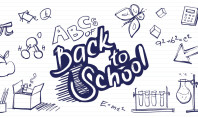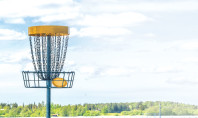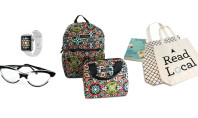6 Tips for a Healthy School Year

August is here and soon we’ll be thinking “back to school.” Good news for some (parents) and not so good news for others (kids). Regardless of your position, the beginning of the school year is inevitable so why not start off with positive attitudes all around? Moravian Academy’s Upper School Nurse, Marian Grencer, RN, recommends the following practices to ensure a healthy and successful school year for everyone.
Exercise
Maintaining an active lifestyle is a habit children should form and carry forward into their adult life. According to Grencer “exercise should be something fun, not a burden. All school age children need to partake in a stress-relieving, fun activity one hour a day.” Not all activities need to be formal, school sponsored teams. Grencer encourages students to find an activity they can be passionate about. Moravian Academy offers an Outdoor Education Program – an option for students who are not into a competitive sport – where several times a week they hike, canoe and go white water rafting. The program is designed to challenge students both physically and mentally and most importantly, have fun!
Nutrition
Breakfast remains the most important meal of the day. During the eight to ten hours of nightly sleep, the body has been off-line with no nutrition. Breakfast provides energy and nutrition that leads to increased concentration in the classroom. Many parents are out the door before their kids in the morning so Grencer suggests planning ahead. “Have ‘grab and go’ healthy options available like yogurt, nuts, fruit and granola bars to ensure your kids get some nourishment into their bodies before the school day begins.”
Time Management
Children like to know what they can expect so establishing routines go a long way for providing emotional well-being. Encourage your children to make weekly lists of priorities and goals and make time to review their progress with them to avoid last minute trips to the craft store and all-night cram sessions. Grencer suggests placing a “good old-fashioned calendar” on the refrigerator where everyone can contribute and see what’s happening that week/month. Some simple planning and organization will reduce stress for the entire household.
Sleep
Sleep is essential for cognition and concentration so to optimize performance, students – regardless of age – need eight to ten hours per night. The invasion of technology has made sleep elusive to many, but teenagers are particularly influenced by its lure. Smart phones, tablets, televisions, laptops and gaming devices should be shut down at least one hour before sleep. Says Grencer, “technology has become people’s pre-sleep activity which is completely counter-intuitive.” Parents should establish rules that all electronics should go offline an hour before bedtime. Grencer proposes replacing technology with a quiet activity – like reading a book – to set yourself up for getting the best sleep possible.
Caffeine has become another sleep detriment for school age children. The influx of fancy, sweet coffees and high-level caffeine drinks is impacting sleep habits as well. Caffeine requires three to five hours to vacate the system so consideration should be taken when deciding when/if a caffeinated drink is appropriate.
Some studies have linked sleep deprivation to obesity, depressions, difficulty regulating emotions and lower grades so a good night’s rest is vital.
Health & Hygiene
Once school starts, illness starts. Of course sleep and good nutrition help keep immune systems strong but children also need to practice good hygiene. Covering their mouth when coughing or sneezing, using tissues and hand washing frequently throughout the day and before meals is a necessity. Most classrooms have hand sanitizer and students are encouraged to use it as needed. Grencer also recommends annual physicals with primary care physicians, flu vaccines and completing and submitting all required paperwork concerning your child’s medical history, medical conditions, allergies and medications to the school prior to the first day of school.
Parents and students should be aware of the proper way to pack (heavier items in the central core of the pack) and wear (both straps over the shoulders with the pack in the middle of the back) a backpack. Children should not be carrying more than 10% of their body weight so only essentials should be carried. Lockers should be utilized and packs should regularly be cleaned and emptied of unnecessary items. Long term health problems from carrying too much weight on the skeleton can easily follow students into adulthood and should be avoided.
Communication
The best conversations still happen around the dinner table. To avoid getting the typical one word answer, Grencer suggestions asking kids “what was the best/worst thing about your school day?” Grencer views school as a time for kids to fail in a safe environment and, although difficult, parents need to accept that. Parents should coach their children on how to deal with problems or challenges so they can develop problem solving skills, time management skills and to come back in the face of adversity.
When all else fails, breathe. Children and families are overbooked and under pressure. Children need to learn mindfulness and self-awareness and be encouraged to un-plug. Taking long, deep breaths for as little as ten minutes a day has been scientifically demonstrated to reduce stress – something we can all benefit from.
Obviously these principles can benefit everyone’s physical and mental health. The earlier these fundamentals are instilled, the more likely they will become habits as your children mature. But it’s never too late – each new school year provides a new opportunity for success!
















